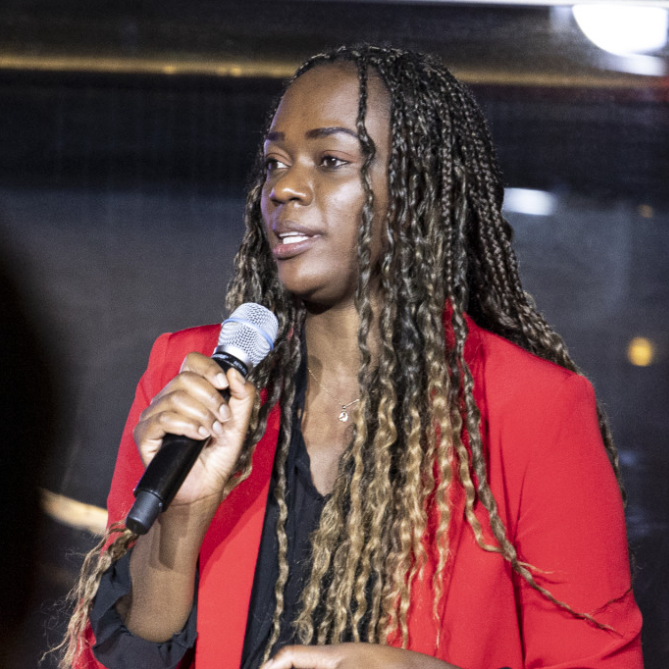Inspiration Talks zu den Grand Challenges
Auf der Inspiration Stage im Museum für Naturkunde präsentieren Wissenschaftler*innenam 1. und 2. November kurzweilige, TED-ähnliche Vorträge mit den neuesten Entdeckungen und innovativer Forschung aus allen Bereichen – von Mathematik und Biologie über Soziologie bis Geschichte.
Leidenschaftliche Wissenschaftlerinnen und Wissenschaftler teilen mutige Ideen und Projekte – im Anschluss gobt es die Möglichkeit, direkt Fragen zu stellen und ins Gespräch zu kommen. Zu jeder der 5 BUA Grand Challenges ist ein Beitrag dabei!
Hannah Strohmeier (Charité)
Racism and Mental Health in the Workplace: Understanding Humanitarian Workers’ Lived Experiences
In this talk, Hannah presents findings from her research on how racism within humanitarian organisations, such as UN entities and NGOs, affects staff mental health and wellbeing. Drawing on interviews with humanitarian workers in Kenya and Jordan, she reflects on the importance of going beyond academic papers and using formats such as documentary film in social justice research. Hannah also introduces her latest diary-based study on responses to racism at work—an innovative method that has not previously been used in the humanitarian sector. Together, the talk and film excerpts illustrate how creative approaches can deepen understanding and support change within humanitarian organisations.
2. November 2025 | 13:15 - 13:30 | CAMPUS im Museum für Naturkunde
Lucas Köhler (HU Berlin)
Persönlichkeit trifft Politik: Moralische Themen und Perspektiven, die uns verbinden und trennen.
Persönlichkeit prägt Politik. Sie beeinflusst, wie wir die Welt sehen, wie wir wählen, welche Themen uns wichtig sind und was uns wütend macht. Ein Teil davon geht auf grundlegende moralische Werte zurück – etwa Fairness, Loyalität oder Autorität –, die unsere Urteile leiten. Genauso wichtig ist jedoch, von welcher Perspektive wir moralische Verstöße wahrnehmen: Nehmen wir Ungerechtigkeit vor allem dann wahr, wenn sie uns selbst betrifft, unsere eigene Gruppe oder andere Menschen? Die Forschung von Lucas Köhler (HU Berlin) zeigt, dass die Kombination aus moralischen Werten und unserer Perspektive am besten erklärt, warum Menschen unterschiedliche politische Ansichten und Verhaltensweisen entwickeln. Der Vortrag lädt ein, zu erkunden, wie Persönlichkeit Politik beeinflusst – mal vereinend, mal spaltend – auf eine Weise, die sowohl anregend als auch aufschlussreich ist.
1. November 2025 | 12:45 - 13:00 | CAMPUS im Museum für Naturkunde
Lucca Valerius (HU Berlin)
Single Light Particles from Diamond - towards the Secure Communication of Tomorrow
Quantum communication is considered one of the most exciting technologies of our time. It uses the laws of quantum physics to
transmit information in a way that is fundamentally secure against eavesdropping, something impossible with classical methods. A key resource for this are single particles of light, called photons, which can carry information. But how can we generate photons that are reliably identical, sharing the same “color” and shape? A promising answer lies in diamond. Tiny imperfections in the crystal, known as color centers, act as miniature light sources. These centers are special because they not only emit photons, but also have an internal “memory”, a quantum property that can store information and connect it to the emitted light, which can be amplified by shaping the diamond in certain ways. Such advances bring us closer to secure quantum networks that could one day be important for personal and global information security.
2. November 2025 | 16:15 - 16:30 | CAMPUS im Museum für Naturkunde
Pedro Alencar (TU Berlin)
How local experiences can reshape how we define and respond to drought.
Droughts are often defined, identified and monitored by means of technical indexes and thresholds. However, these measures don’t always reflect what we as humans actually feel and face, from dying crops, to dried-up wells. In this talk, I introduce a new proposed framework that combines community experiences with models (of climate and ecosystems) to create local definitions of drought, powered by people's knowledge, life experience, and expectations. By listening to people’s stories and linking them with scientific data, we can better capture real impacts, inspire action, and strengthen resilience in the face of a changing climate.
2. November 2025 | 11:00 - 11:15 | CAMPUS im Museum für Naturkunde
Robert Hrynyschyn (Charité)
Virtual parties, real choices: how VR supports adolescents resisting alcohol’s peer pressure
Alcohol is part of everyday life, and many young people struggle to say 'no' when friends are drinking. Instead of substance use education, imagine stepping into a virtual party where you can try out how to react when someone offers you a drink. In our presentation, we will introduce a VR simulation that was co-created by young people and prevention experts. You’ll see how this tool enables decisions in safe, realistic scenarios. We’ll share how young people experienced the simulation and we will explore how digital tools like VR can make prevention innovative, appealing, and effective. The talk combines research, real-life stories, and a glimpse into the future of health promotion.
2. November 2025 | 12:45 - 13:00 | CAMPUS im Museum für Naturkunde
Einlass
Man kann jederzeit vorbeikommen und gehen: die Türen öffnen um 10:30 Uhr und schließen um 17:30 Uhr. Reservierungen oder Tickets sind nicht nötig. Die Talks finden alle 15 Minuten statt und sind in Blöcke zu je vier Vorträgen gegliedert. Jeder Block endet mit einer 20-minütigen Meet the Scientists-Session.

